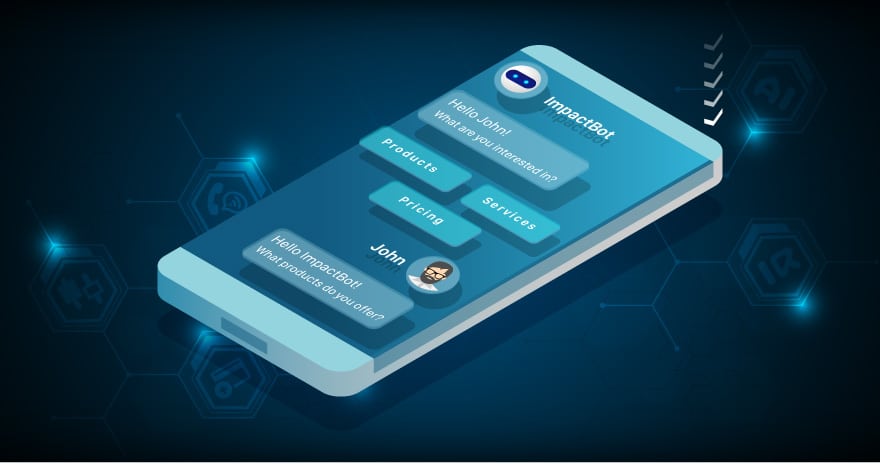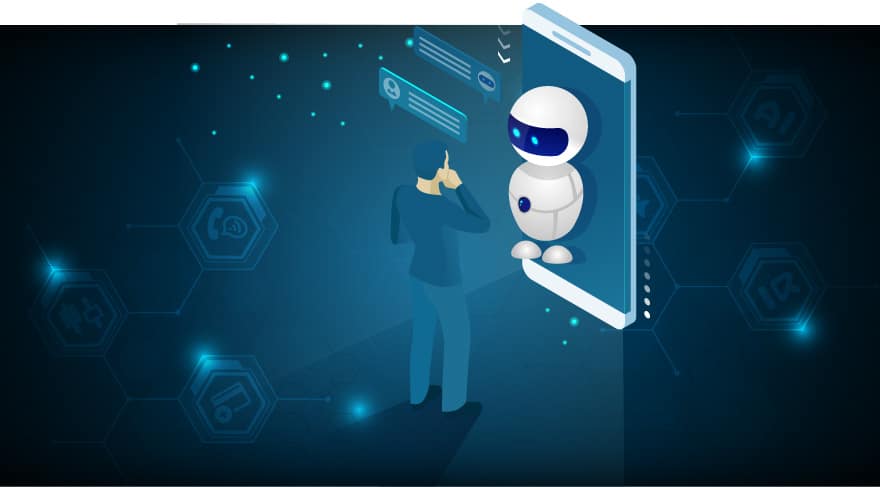The introduction of conversational AI to chatbots has expanded their capabilities and is driving business performance to new levels.
Conversational AI focuses on communicating through natural language. Users interact with chatbots as though they were having a normal conversation instead of clicking through a menu or using a predetermined command with prefixes.
Juniper research predicts conversational AI will cut business expenses by $8 Billion by 2024. The potential cost savings alone warrant further investigation, but conversational AI doesn’t only reduce expenses, it produces more conversions and higher revenue.
Voice of customer (VoC) platform Usabilla reveal that the acceptance level of AI and chatbots is increasing. 70% of those polled said that they have used chatbots already, and of those who have not, 60% said that they would feel comfortable doing so. Additionally, 54% would always choose a chatbot over a human if it saved them time.
Chatbots using conversational AI enable a business to both micro-target and personalise at scale. Having one-to-one, personalised conversations with millions of people has never been possible manually.
They also offer the added benefits of maintaining brand consistency and 24/7 availability. Response and waiting time are less and shifting a significant volume of work to a tireless chatbot results in better use of manpower.
These chatbots don’t complain, never overreact, they don’t forget their training or need meticulous monitoring. They are the most efficient and reliable customer-facing ‘employees’ available to business.

Virtual sales assistants with conversational AI can be set to automatically contact and engage prospects using natural language conversation until the prospect turns into a customer or opts out. They are multi-lingual and can interact with customers across their entire lifecycle. They can also gather information which improves customer satisfaction by highlighting pain points and which features are most desirable.
More AI, Less Friction
E-commerce checkouts have contributed significantly to the increase in online sales. But customers still encounter friction points which prevent conversions. When customers overlook a data field entry or misinterpret how they’ve got to put in a date of birth, phone number or address this generates an error message or requires customers to go back and correct.
AI-sales assistants interpret these friction points and automatically offer a solution. If a customer fills out a form in the wrong format the chatbot adjusts it, corrects it, or plays it back to the customer and asks: ‘Did you mean this?’ or something similar.
A misplaced fear about AI is that it replaces people and will increase unemployment. On the contrary, the increase in qualified Leads creates a need for more sales people to follow up on them.
It also increases workforce efficiency. Instead of spending 80% of their time chasing deals, salespeople can spend that time focused on closing deals.
Conversational AI assistants will continue to become smarter and easier to use. The effectiveness of AI in business is determined by how much data it is fed. The more data it analyses the ‘smarter’ it gets. Machine Learning (ML) refines the responses used by chatbots as more data is collected about your business. These chatbots keep improving with adjustments made based on the results being achieved.
When selecting a chatbot solution a business needs to determine if it is customisable to its industry and how much data it is supplied with to accelerate its ‘learning’.
ImpacTech’s intelligent chatbot is the most effective solution currently available. They’ve taken a hybrid approach to teaching chatbots how to respond which are fine-tuned through rule-based AI and ML.
Their chatbots are customisable and their effectiveness increases more rapidly than other one-size-fits-all solutions because the AI systems learn from data collected by Impact CRM through sales transactions, customer service tickets, emails, and phone call recordings in addition to the chatbot interactions.
The Limassol company’s highly effective automated lead scoring tool is a key feature in their intelligent chatbot solution. It highlights the leads most likely to convert and reveals which interactions lead to the highest conversions using built-in Analytics .
The prediction accuracy of the automated lead scoring tool is currently at 86.7% and will increase as more data is fed to the ML algorithm.
Better Customer Satisfaction
Customer satisfaction has always been a key component of success in business. The problem has been keeping up with the ever-increasing standards. Today, 75% of consumers expect a response within five minutes after making contact online.
Research also reveals that 25% of customers will not return after just one bad experience. Customers expect the same level of service they experience when using Google, Apple and Amazon. That means achieving the same levels of immediacy, personalisation and convenience.
Vodafone UK addressed this challenge by streamlining its order process online with its ‘intuitive’ chatbot TOBi. It is the first chatbot in the telecom industry that can complete a customer transaction from start to end in the UK. In the short time since its introduction it has improved customer completion rates and satisfaction.
The AI assistant has also boosted conversion rates online by making sales two to three times faster than the traditional website. This translates into order completion taking just eight minutes to complete an from start to finish.
A significant number of potential customers were dropping out during the check-out process which Vodafone addressed by implementing chatbots. It answers queries during the customer journey, suggests suitable products and offers along the way and features intuitive prompts to intercept any potential issues based on common FAQs.
Chatbots have helped Vodafone double the conversion rate from basket to checkout in comparison to the website in the initial month of going live. It has helped to improve brand scores. The net promoter score (NPS) for those who have used it is close to 80, far higher than the score for consumers that only use the website, which has a score in the 60s.
Smarter Responses
Conversational AI assistants will become smarter and easier to use in the future. Their capabilities and responsive intelligence will increase to the point where it will eventually be impossible to determine whether you a dealing with a person or a chatbot.
The advantage of early adoption lies in the speed at which the technology ‘learns’ the intricacies of an industry and understands the profile of the customers that drive your business. Increased productivity, reduced costs, and more conversions from leads will flow naturally during industry customisation.
Conversational AI is the only viable path towards achieving the level of personalisation today’s and tomorrow’s consumers expect. Chatbots that support conversational AI will be able to make full use of all the data collected throughout the customer journey and deliver an increasingly personalised response at scale.
The defining characteristic of all successful technology is how much easier they make lives. Customers who interface with them will receive a consistently better, more personalised response while humans are freed from the burden of mundane tasks to focus on more creative or skilled challenges.












